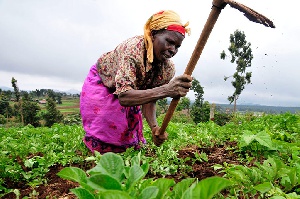The Peasant Farmers Association of Ghana (PFAG) is calling on the government to redraft the Plant Breeders Bill (PBB) to protect Ghanaian smallholder farmers and their livelihood.
“The Bill in its current state undermines and threatens the inherent right of indigenous peoples and farmers to own, save and share their traditional germplasm and biodiversity, which is necessary for their survival. The privatisation of seed and biodiversity through any intellectual property rights (IPR) regime, favours large-scale plant breeders, while violating the basic right to seed of indigenous communities and smallholder farmers who depend on seed as a resource for survival,” PFAG argued.
These were contained in a position paper read at the end of a demonstration in Accra last Friday to lay bare the flaws in the PBB and the implications of adopting Genetically Modified Organisms (GMOs) in Ghana. The demonstration was jointly organised by PFAG, Action Aid Ghana and the Centre for Indigenous Knowledge and Organisational Development (CIKOD). The demonstration brought together over 300 farmers from across the country to protest against the PBB and to call on government not to allow multinational seed and chemical companies to take over the country's seed market from Ghanaian seed producers and indigenous farmers.
Some of the demonstrators carried placards with the inscriptions 'PBB is biopiracy,' 'Monsanto, leave Ghana alone,' 'MPs, please reject the PBB,' among others.
PFAG's call comes at a time when massive protests by civil society organisations such as Food Sovereignty Ghana, Coalition for Farmers Rights and Advocacy against GMOs and others forced Parliament to ask the government to withdraw the PBB for further consultation and review. Public Agenda of Friday, January 31 – Sunday, February, 2014 reported that the Chairperson of the Coalition for Farmers Rights, Ms Samia Nkrumah, said that the PBB “is written in opaque legalese English and is very difficult to understand.”
Addressing demonstrators, the Vice President of PFAG, Mr Godwin Atokple, pointed out that an attempt to delink the PBB from the current global discussions on GMOs was erroneous as the PBB provided the legal framework for the introduction of new varieties, including GMOs.
According to Mr Atokple, several studies of animals indicated serious health risks such as infertility, accelerated aging, faulty insulin regulation, changes in major organs and gastro-intestinal system and immune problems are associated with GM food. He noted: “GM seeds will make Ghanaian farmers dependent on foreign corporations for seeds. Where GM seed is grown, farmers are forbidden from saving their seed. They are legally obliged to buy new seed each season. Farmers will lose the right to freely use, select, share and sell seeds. Accepting GMOs will amount to re-colonisation of the Ghanaian economy.”
He recommended the need for a legislation to regulate access by corporations to the biological resources, knowledge and technology of small Ghanaian farmers so that access would be allowed only with the prior informed consent of the local communities and the State. Farmers' rights, he said, should be enshrined in the PBB to protect them. He added: “There is a need for [the] establishment of a competent bio-safety authority with proper representation of farmers and consumer groups to uphold strong regulatory requirements on GMOs, to ensure monitoring and to take major decisions on the PBB and GMOs in the public interest.”
Click to view details



Business News of Tuesday, 10 June 2014
Source: Public Agenda

















